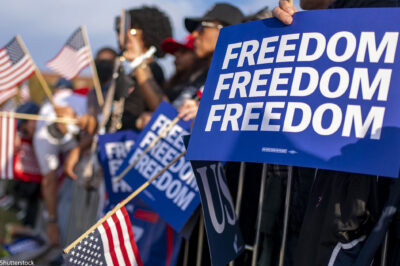
The Supreme Court of which state granted a stay of execution to Willie Manning, who may be innocent of the crime for which he was convicted?
True or false? Eye-tracking technology could pose a risk to privacy if inappropriately used to discover drug and alcohol use, mental and psychological illnesses, sexuality and other traits and behaviors.
Documents released this week suggest that which federal agencies read private emails without obtaining a warrant first?
Which federal agency has continued to increase its surveillance of Americans in the past year, according to the Department of Justice’s annual report?
A report by which organization shows the racial gap in U.S. wealth creation grew substantially during the Great Recession?
Willie Manning Is Scheduled To Die. Shouldn't Mississippi Find Out If He's Innocent First?
Willie Manning was granted this Tuesday a stay of execution by the State Supreme Court. Mississippi was steamrolling toward execution despite compelling evidence that Willie Manning may be an innocent man.
Manning's case has many of the hallmarks of those of other innocent death row exonerees: false snitch testimony, junk science, and racial bias. The prosecutors in Manning's case, like in all too many cases, stacked the deck by systematically removing African-American jurors from Manning's trial. Manning, an African-American man, was convicted of the murders of two white college students.
The Privacy-Invading Potential of Eye Tracking Technology
Eye-tracking technology received new attention recently due to its inclusion in the Samsung Galaxy IV phone, where it can (with mixed results, according to reviewers) let users scroll the screen with their eyes or dim the screen when they look away. Clearly this is a technology that has the potential for a lot of clever applications. But what are the privacy implications?
FBI Documents Suggest Feds Read Emails Without a Warrant
New documents from the FBI and U.S. Attorneys’ offices paint a troubling picture of the government’s email surveillance practices. Not only does the FBI claim it can read emails and other electronic communications without a warrant—even after a federal appeals court ruled that doing so violates the Fourth Amendment—but the documents strongly suggest that different U.S. Attorneys’ offices around the country are applying conflicting standards to access communications content.
They’re Watching: FBI Business Records Requests Jump 900 Percent Compared to 2009
Last week served as yet another reminder of the threats posed to Americans' privacy by the post-Patriot Act surveillance state. According to the Department of Justice's annual report, FISA applications to the secretive Foreign Intelligence Surveillance Court (FISC) in 2012 revealed a continued increase in the FBI's surveillance of Americans. The report covers the Bureau's requests for electronic and physical surveillance, secret court orders under Section 215 of the Patriot Act, and National Security Letters (NSLs).
The Racial Wealth Accumulation Gap and Why ACLU is Suing Morgan Stanley for Racial Discrimination
This month, the Urban Institute joined an emerging consensus of researchers and social scientists with a new report revealing, in the starkest terms, our nation's vast and widening racial gap in wealth creation. With this report, Less than Equal: Racial Disparities in Wealth Accumulation, the Urban Institute joins a growing body of research showing that in America today, wealth is not colorblind and that during the recession this gap has widened.
Learn more about your civil liberties: Sign up for breaking news alerts, follow us on Twitter, and like us on Facebook.




